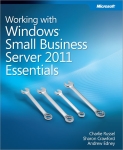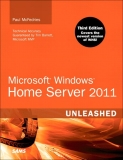We Are Still Committed to Windows Home Server
There has been some sad announcements lately regarding Windows Home Server, but in my opinion even taking these into account Windows Home Server v1 and Vail is still and will be the best option out there. Automated quick backup, if necessary a single image recovery, remote access… the list carries on. We were committed to Windows Home Server here at mswhs.com, and will continue our commitment with Windows Home Server “Vail” too. But we are not the only ones. The following companies give details on where they are heading with Home Server.
Acer, regarding the easyStore Home Server from Gianpiero Morbello, vice president of marketing and brand:
Vail will have a big impact on the home media environment, providing an easy streaming and seamless digital file sharing experience for consumers, and Acer is excited to be alongside Microsoft delivering on this goal
Tranquil PC have stated that they will continue to manufacture, supply and support all derivatives of the Windows Home Server product:
Is this the end of Home Server? Not in the slightest. “It’s a new beginning, an exciting future awaits us” says D J Thompson, Managing Director of Tranquil PC “there is a huge following for Home Server, and the V1 product does just what it says on the tin, which is to deliver an outstandingly simple, reliable and effective solution for home and small business PC user alike. There are other solutions that can provide single elements of Home Server, but there is nothing that delivers the whole package, and there is unlikely to be so in the near future. We are entirely committed to the future of Windows Home Server V1, V2 and beyond. We will also ensure that there is a suitable transition path from V1 to V2 for our existing and new clients.
Raxco Software the makers of the defrag add-in PerfectDisk 11 Windows Home Server had the following to say:
…you can be assured our intent is for PerfectDisk to fully support Vail in whatever form it ultimately takes and provide the best WHS defrag and free space consolidation, helping ensure an optimized WHS environment for whatever version of WHS a user is running.
While Vail and Drive Extender are together no more, PerfectDisk, WHS defrag and Vail will be together still…
And don’t forget Microsoft continues to work on delivering ”Vail” to us, bringing the best solution possible – Windows Home Server onwards and upwards!
Share this WHS Article with Others:





Well, these companies at the moment vote their support since they have products they are trying to sell us. However, once Vail will be released in its current predicted form it will lose most of its potential clients and then (once sales will drop) these companies will drop their support in this (poor) product!
HP claim that they dropped the support not because of the DE debacle, but I think the truth is bended a bit due to business / contractual restrictions.
WHS is now a walking ghost. Vail will very likely be canceled and that will be it.
So we have Acer and, uh, Tranquil, and, uh, Acer, and, uh… uh…
WHS, RIP. We hardly knew ye.
Philip,
I understand your desire to be supportive of WHS after all the efforts you have made on behalf of the WHS community over the past few years.
That said, it is clear from the reaction of the the many users on your site and other forums that Microsoft’s decision has effectively killed the product. After reflecting on what this really means and the importance to me of the lost WHS features, I have reluctantly deleted Vail from my test box and have now started playing around with other options including Amahi and UnRaid. I wish that was not the case but WHS as a home server platform is in my opinion DEAD.
Respectfully I suggest that instead of flogging a dead horse (VAIL), I think it would be much more productive to migrate the core focus of your site to exploring and reviewing various open source alternatives that can be supported long term by a community and not dependent on the whims of a single company.
After this WHS fiasco, I am no longer willing to be at the mercy of any company (Microsoft or any other) where a single management decision can impact and/or kill the future of a key product that many people have come to depend on for their home server solution.
I agree 100% with David. What was a great low-cost solution to many small businesses and non-profits is gone. Using RAID will increase the cost and complexity and pretty much eliminates the repurposing of old hardware as a WHS server in these environments. The HP MediaServer was the first and most visible WHS server… it’s death is significant and telling.
Once again, Microsoft has failed to understand and support its customer base… time to move on.
I am sorry Philip but I have to agree with David and Henri. Although the “other” uses for WHS are nice, I myself consider those as extra or bonus features most of which I have no use for. Everybody that I have converted over to WHS switched over purely for DE. Without DE there is no WHS, simple as that.
Phillip,
“And don’t forget Microsoft continues to work on delivering ”Vail” to us, bringing the best solution possible – Windows Home Server onwards and upwards!”
WTF??? You don’t get it either.
Without DE, Vail isn’t as functional as the product it proposes to replace. How long do you suppose those vendors will support a product that nobody wants?
I’ve only recently discovered WHS. I was so impressed with the V1? (the one with power pack 3) downloadable demo that I bought WHS OEM the same night. ($79 from Tigerdirect – not bad!)
Everyone seems to love the WHS they’re currently running. Why worry about Vail? Just keep running what you have and be happy 🙂 It’ll take a good 10 years for MS to finally cut off support for this version (just look at XP support). In the meantime, we’ve all got 10 years to find a suitable replacement.
I also agree with what David said. I was such an early supporter of WHS, evangelizing it at my former work place, a software company that makes backup software, now I look rather foolish. Personally, the thing that made WHS so awesome was Drive Extender.
Now? Well, I’m looking at Greyhole with Amahi. I wish some company would come out with something that uses ZFS for the home market, like a Drobo box but without the insane price of Drobo.
VERY, VERY, VERY dissapointing.
I will continue to use WHS v1 until I can’t anymore. My guess is that this will be two to three years.
After having read every single comment (over 1,000) on the MS connect website. It is clear that WHS vail is dead without DE. WHS and DE are integral.
Without DE it is my guess that sales of WHS v2 will be less than 10% of what the product would be otherwise. Will these companies and more importantly MS have the fortitude to live within the barren landscape of sales that will be WHS v2 Vail (w/o DE), until it either dies or MS gets their a$$ in gear, and adds DE back in.
In the mean time. Will these companies support WHS Vail, when NOBODY is buying the product?
Will MS have the “committment” to WHS v2 or even v3 to add back in DE?
I don’t think MS has too long before they loose good will and the momentum they have developed.
From my read of the comments above and in other fora, WHS may indeed fail. But if it fails, it will do so because of a misunderstanding of the utility DE provided and of RAID’s suitability as a natural successor.
For a start, WHS was, for me, always about effortless, space-efficient workstation backup, and I see no evidence that this critical feature is going away.
But I do agree with what many have said: RAID as it currently exists is not a consumer-friendly technology, and it is unrealistic to expect the unsophisticated part of the WHS consumer base to embrace it.
But here’s why it doesn’t matter so much: Neither RAID nor DE folder duplication are about backup. They are about availability. If you have data stored only on RAID- or DE-protected drives, then that data is not protected from many common forms of data loss – including hardware failure!
I don’t consider my WHS shares protected until they are backed up on separate media in a separate chassis.
With *that* said, HP’s departure from the scene is a big blow. Toshiba is still a first-tier manufacturer, however, and they have done a credible job with their WHS products.
If the understandably disappointed faithful will calm down for a while, perhaps we’ll see WHS continue to thrive.
@Lauren
I agree that backups are a great and key feature, but that’s not what’s at issue.
If Joe-consumer buys a WHS v2 machine with 2 1TB drives pre-installed, I’m guessing they will be setup as RAID 1, which only gives you 1 TB of storage. So right out of the box, you’ve lost half your storage capacity (over DE). So not only is the poor guy paying more for the hardware, he’s got to pay for more disk space too. So the starting price for WHS will be higher.
What happens when that space runs out? Can you throw in another drive? Not that easy. You’ve got to get a similar drive and move to RAID 5 (new controller?). Same problem when moving beyond 4 drives (RAID 10?). Who’s going to do that and at what cost? Not Joe-consumer. And probably not his geeky brother-in-law either.
Hardware vendors and service geeks will be happy, but not Joe-consumer who thinks RAID is for killing bugs.
The not-so-faithful are calm… but aware and keen to point out that this is a stupid decision. By dragging WHS into the business world (using RAID), it’s no longer a consumer product. They should just have VAIL using DE and AURORA using RAID… win-win and everbody’s happy.
PS: I didn’t realize that Toshiba had a WHS offering…
@Henri – after all this time, it occurred to me that I didn’t mean Toshiba, I meant ASUS. I suppose it’s not so surprising that I might confuse them, what with their spellings being so similar and all…
mea culpa.
@Henri – I agree with you about RAID. If MS tries to replace DE with RAID, they will have missed part of their market, and will surely create some resentful customers down the road.
Indeed, this seems so self-evident that I would suggest that at least one of the following two propositions is false:
1) Vail WHS boxes will be configured with RAID arrays.
2) Joe Consumer is the target market for WHS v1 or v2.
I lean toward number 2 being false. From what I’ve read and seen, WHS seldom sold to people who weren’t technically-inclined, or to their clients and family. I recommended it myself to several of each, believing that I would virtually never hear complaints or calls for help.
But when it came time to replace or upgrade hard drives, I fully expected to get a call, despite MS’s efforts.
If they had made major sales to technically unsophisticated users, they might not have thrown DE away at all.
From the comments I’ve read here, there seems to be a notion that people who don’t understand RAID will be lost with a WHS that only supports RAID. What I would argue is that even users that are technically savvy who understand everything about RAID: levels, controllers, drive requirements, mirroring, parity ect… may STILL NOT WANT RAID for their home storage solution because of the many requirements. A big WHS main appeal for me is the inexpensiveness of the software redundancy solution that Microsoft has come up with that is called Drive Extender. For the home the solution is ideal whether your technically savvy or not! You can use drives you have laying around of different capacities, form factors, manufacturers and interfaces! wow! As long as you can plug the darn thing into your box, it can be added to the DE storage pool. Wonderful! So you can put your old equipment to good use just by installing the WHS OEM and presto you have an inexpensive home server with killer features! If RAID is required we are back to square one! Buy a Drobo? No thank you!
Since the initial press release on this, I felt elminating DE was going in the wrong direction for the home consumer, but now I have some positive thoughts. I mean, 2tb drives can be had on sale for $79.00. Throw a few of those in, and space management is not that difficult for the home user. Its not like V1 where we used up old parts for frankenserver. I am concerned how it will appear in media center. If they can drop DE and still have it match up nicely with Media Center, then I am probably ok going forward. I really like the internet streaming, no wonder they bought out that company that started it up.